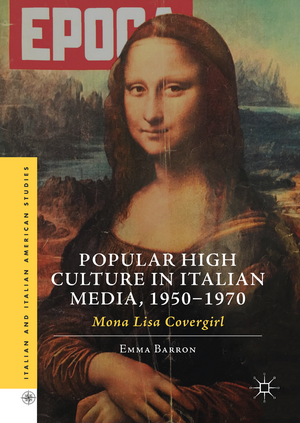Popular High Culture in Italian Media, 1950–1970: Mona Lisa Covergirl: Italian and Italian American Studies
Autor Emma Barronen Limba Engleză Hardback – 31 aug 2018
| Toate formatele și edițiile | Preț | Express |
|---|---|---|
| Paperback (1) | 529.43 lei 38-44 zile | |
| Springer International Publishing – 14 dec 2018 | 529.43 lei 38-44 zile | |
| Hardback (1) | 595.07 lei 6-8 săpt. | |
| Springer International Publishing – 31 aug 2018 | 595.07 lei 6-8 săpt. |
Din seria Italian and Italian American Studies
- 20%
 Preț: 691.02 lei
Preț: 691.02 lei -
 Preț: 299.96 lei
Preț: 299.96 lei - 18%
 Preț: 564.34 lei
Preț: 564.34 lei - 20%
 Preț: 691.06 lei
Preț: 691.06 lei - 9%
 Preț: 693.79 lei
Preț: 693.79 lei - 9%
 Preț: 763.23 lei
Preț: 763.23 lei - 20%
 Preț: 629.01 lei
Preț: 629.01 lei -
 Preț: 305.50 lei
Preț: 305.50 lei -
 Preț: 382.95 lei
Preț: 382.95 lei -
 Preț: 389.70 lei
Preț: 389.70 lei -
 Preț: 383.93 lei
Preț: 383.93 lei - 28%
 Preț: 437.24 lei
Preț: 437.24 lei - 24%
 Preț: 460.93 lei
Preț: 460.93 lei -
 Preț: 388.72 lei
Preț: 388.72 lei - 34%
 Preț: 464.99 lei
Preț: 464.99 lei -
 Preț: 386.57 lei
Preț: 386.57 lei -
 Preț: 389.49 lei
Preț: 389.49 lei - 15%
 Preț: 524.22 lei
Preț: 524.22 lei -
 Preț: 387.75 lei
Preț: 387.75 lei -
 Preț: 396.40 lei
Preț: 396.40 lei -
 Preț: 390.84 lei
Preț: 390.84 lei - 5%
 Preț: 714.83 lei
Preț: 714.83 lei -
 Preț: 384.86 lei
Preț: 384.86 lei -
 Preț: 387.75 lei
Preț: 387.75 lei -
 Preț: 389.70 lei
Preț: 389.70 lei - 30%
 Preț: 514.90 lei
Preț: 514.90 lei -
 Preț: 385.84 lei
Preț: 385.84 lei - 30%
 Preț: 510.10 lei
Preț: 510.10 lei -
 Preț: 387.75 lei
Preț: 387.75 lei - 27%
 Preț: 438.76 lei
Preț: 438.76 lei -
 Preț: 388.72 lei
Preț: 388.72 lei -
 Preț: 389.49 lei
Preț: 389.49 lei - 18%
 Preț: 733.46 lei
Preț: 733.46 lei - 24%
 Preț: 461.18 lei
Preț: 461.18 lei -
 Preț: 384.86 lei
Preț: 384.86 lei -
 Preț: 263.83 lei
Preț: 263.83 lei -
 Preț: 386.81 lei
Preț: 386.81 lei - 15%
 Preț: 638.43 lei
Preț: 638.43 lei -
 Preț: 390.63 lei
Preț: 390.63 lei -
 Preț: 383.93 lei
Preț: 383.93 lei -
 Preț: 392.60 lei
Preț: 392.60 lei -
 Preț: 387.75 lei
Preț: 387.75 lei -
 Preț: 386.81 lei
Preț: 386.81 lei -
 Preț: 388.72 lei
Preț: 388.72 lei
Preț: 595.07 lei
Preț vechi: 700.08 lei
-15% Nou
Puncte Express: 893
Preț estimativ în valută:
113.88€ • 123.66$ • 95.66£
113.88€ • 123.66$ • 95.66£
Carte tipărită la comandă
Livrare economică 22 aprilie-06 mai
Preluare comenzi: 021 569.72.76
Specificații
ISBN-13: 9783319909622
ISBN-10: 3319909622
Pagini: 376
Ilustrații: XV, 337 p. 25 illus., 9 illus. in color.
Dimensiuni: 148 x 210 mm
Greutate: 0.73 kg
Ediția:1st ed. 2018
Editura: Springer International Publishing
Colecția Palgrave Macmillan
Seria Italian and Italian American Studies
Locul publicării:Cham, Switzerland
ISBN-10: 3319909622
Pagini: 376
Ilustrații: XV, 337 p. 25 illus., 9 illus. in color.
Dimensiuni: 148 x 210 mm
Greutate: 0.73 kg
Ediția:1st ed. 2018
Editura: Springer International Publishing
Colecția Palgrave Macmillan
Seria Italian and Italian American Studies
Locul publicării:Cham, Switzerland
Cuprins
1. Introduction: The Mona Lisa Covergirl.- 2. Italia domanda: A question of culture.- 3. Dear Intellectual: The cultural advice columns.- 4. Lascia o raddoppia?: Contestants and the classics.- 5. Lip-syncing Rossini: The highs and lows of Italian television opera.- 6. Puccini, Botticelli and celebrity endorsements: The art of magazine advertising.- 7. Reciting Shakespeare for Amaretto di Saronno: The art of Carosello.- 8. The classics and the everyday: From I Promessi Sposi to I Promessi Paperi.- 9. Patrolling the border: I Promessi Sposi on RAI television.- 10. Conclusion: The smile of Bergman, the body of Rita and the face of Mona Lisa.
Notă biografică
Emma Barron teaches European film and history in the Department of History at the University of Sydney, Australia, and is an Honorary Research Associate at the Australasian Centre for Italian Studies.
Textul de pe ultima copertă
When Mona Lisa smiled enigmatically from the cover of the Italian magazine Epoca in 1957, she gazed out at more than three million readers. As Emma Barron argues, her appearance on the cover is emblematic of the distinctive ways that high culture was integrated into Italy’s mass culture boom in the 1950s and 1960s, a period when popular appropriations of literature, fine art and music became a part of the rapidly changing modern Italian identity. Popular magazines ran weekly illustrated adaptations of literary classics. Television brought opera from the opera house into the homes of millions. Readers wrote to intellectuals and artists such as Alberto Moravia, Thomas Mann and Salvatore Quasimodo by the thousands with questions about literature and self-education. Drawing upon new archival material on the demographics of television audiences and magazine readers, this book is an engaging account of how the Italian people took possession of high culture and transformed the modern Italian identity.
Caracteristici
Examines how Italy incorporated its rich cultural heritage into its modern identity during industrialisation Offers case studies from popular magazines, television and advertising to trace collapsing boundaries between elite and mass culture Foregrounds overlooked cultural materials such as popular magazines in the cultural history of Italy in the 1950s and 1960s
